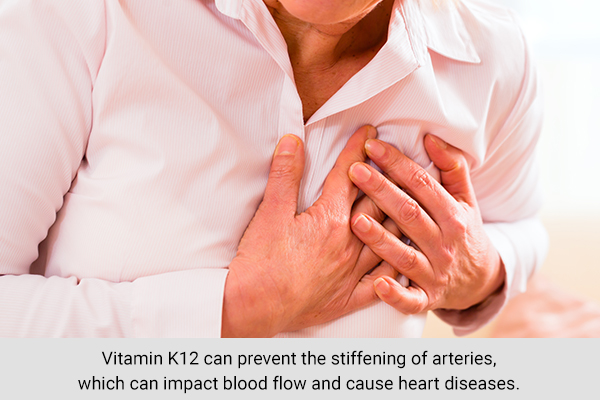In this article:
Vitamin K is a fat-soluble vitamin that plays a role in the production of proteins involved in the process of blood clotting as well as balancing calcium.

There are many types of vitamin K, but vitamin K2 is primarily involved in the production of new bone and transportation of calcium through the body to be deposited into bones. (1)
Vitamin K2 and Bone Health
It is well known that vitamin D is involved in the maintenance of healthy bones. It increases the absorption of calcium in the intestines and its deposition into the bones.
Obtained through foods such as fatty fish, dairy, and eggs, vitamin D is also synthesized in the skin upon exposure to the sun. (2)
Vitamin K2 is transported to the tissues of the bone and blood vessels after absorption and plays a role in the production of new bone cells. It is found in fermented food items such as sauerkraut and kimchi and is also produced in the intestines by lactic acid bacteria. (2)
A review of multiple studies has also identified the role of vitamin K2 in preventing fractures in older women who experience age-related bone loss, suggesting its supplementation to be useful in women with osteoporosis. (3)
Moreover, according to studies, supplementation with less than 500 mcg of vitamin K2 in combination with vitamin D can be significant in increasing bone mineral density. (4)
The exact dosage of supplementation may vary with age, and you may need to consult a doctor to identify your ideal dose.
Vitamin K2 in the Body
Vitamin K2 also plays other important roles in the body beyond bone health.
1. K2 and the heart

Vitamin K2 can prevent the stiffening of arteries, which can impact blood flow and cause heart diseases. Supplementation with 180 mcg of vitamin K2 a day can be beneficial. (5)
2. K2 and brain
Vitamin K2 can also be beneficial in increasing the activity of brain cells. It is involved in functions such as signaling, growth, and survival of cells that are needed to prevent age-related diseases such as Alzheimer’s and Parkinson’s disease. (5)
3. K2 and nerves
Diabetic neuropathy is a complication of type 2 diabetes that can cause damage to the nerves of the feet and hands. In a study, 100 mcg of vitamin K2 twice a day for 8 weeks was beneficial in reducing the symptoms of diabetic neuropathy. (5)
Most-Asked Questions About Vitamin K2
Can there be an excess of vitamin K2?
K2 is a fat-soluble vitamin that is not excreted out of the body as easily as water-soluble vitamins. For this reason, you need to be cautious not to take too much vitamin K (more than 500 mcg per day).
What are the symptoms of too much vitamin K2?

Excessive K2 can be identified if you have difficulty in breathing, swallowing, lightheadedness, sudden skin rashes, tightness of the chest, and swelling of the lips, eyelids, and face. These symptoms may not always indicate an excess of K2, and you must consult a doctor immediately.
Can I take vitamin K2 during pregnancy?
Vitamin K2 may not be safe for women during pregnancy. Consult your doctor for more information.
Final Word
Vitamin K2 is an important vitamin needed for proper bone development. It increases the ability of vitamin D to deposit calcium into the bones and increases the production of new bone cells.
In addition, it is beneficial for brain health, heart health, and the management of nerve issues arising from complications of diabetes.
- Was this article helpful?
- YES, THANKS!NOT REALLY


